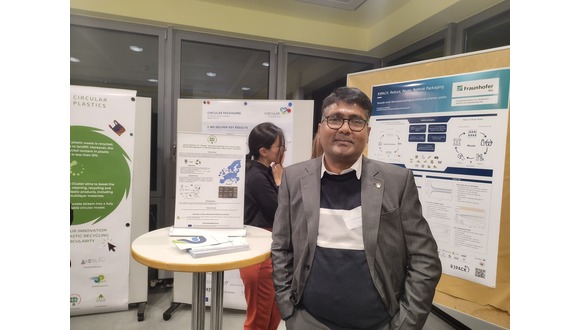Tue, 12 December, 2023
Dr Kranthi Maniam, a Senior Project Leader of Technology at TWI, presented findings from the SOL-REC2 project at the recent Circular FoodPack Conference in Germany.
The insightful presentation showcased the significant technical achievements and industry benefits of the SOL-REC2 project, with a particular focus on food packaging and demonstrating a significant step forward in addressing the challenges of plastic recycling and sustainable packaging.
The event, which was held at the Fraunhofer Institute for Process Engineering and Packaging IVV in Germany, was a hub for discussing circularity in the food packaging sector.
 Dr Kranthi Maniam
Dr Kranthi Maniam
Food packaging is designed to protect products during transportation and to maximise shelf lives in order to reduce food waste. As such, food packaging needs to be impermeable, tear-resistant, printable, lightweight and, of course, safe to use with foodstuffs. In order to fulfil these requirements, most food packaging is made from plastic films comprised of complex multi-layered materials, yet these multi-layer composite (MLC) laminates are difficult to recycle, leading to much of it being incinerated or sent to landfill.
The aims of Circular FoodPack are similar to those of the Horizon 2020-funded SOL-REC2 project, which takes the principles of the circular economy and applies them to multi-material recycling alongside the development of innovative sorting and recycling techniques.
The 36-month SOL-REC2 project is investigating the sorting, separation and recycling of pharma blister packs and laminate consumer packaging that is comprised of multiple layers of polymers and aluminium. This will deliver the sustainable production of high-purity polymers and aluminium, creating an income stream for recyclers while reducing the environmental impact and carbon footprint associated with virgin plastic production and bauxite mining, whilst also making a valuable contribution to the circular economy.
TWI has been working in collaboration with Solvionic, Mikrolin, Plastigram Industries, AIMPLAS, Materials Innovation Centre (MatIC), University of Leicester and FiliGrade on the SOL-REC2 project, you can find out more on the dedicated website, here.
This project has received funding from the European Union’s Horizon 2020 research and innovation programme under grant agreement No. 101003532.